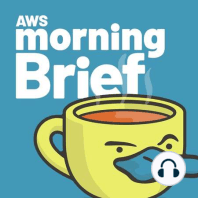11 min listen
AWS Isn’t a Threat to OSS
ratings:
Length:
19 minutes
Released:
Jul 23, 2021
Format:
Podcast episode
Description
TranscriptCorey: This episode is sponsored in part by LaunchDarkly. Take a look at what it takes to get your code into production. I’m going to just guess that it’s awful because it’s always awful. No one loves their deployment process. What if launching new features didn’t require you to do a full-on code and possibly infrastructure deploy? What if you could test on a small subset of users and then roll it back immediately if results aren’t what you expect? LaunchDarkly does exactly this. To learn more, visit launchdarkly.com and tell them Corey sent you, and watch for the wince.Jesse: Hello, and welcome to AWS Morning Brief: Fridays From the Field. I’m Jesse DeRose.Amy: I’m Amy Negrette.Tim: And I’m Tim Banks.Jesse: This is the podcast within a podcast where we talk about all the ways we’ve seen AWS used and abused in the wild. Today, we’re going to be talking about AWS, an open-source software. Now, that’s kind of a broad topic, but there have been some specific, recent events I’ll say, over the last year maybe or maybe even less, related to AWS and open-source software that really got us talking, and I wanted to have a deeper conversation with both of you on this topic.Tim: Well, you should probably start by going over some of the things that you’re mentioning, when you say ‘some of these things,’ what are those things, Jesse?Jesse: Yeah. So, I think the best place to start is what constitutes open-source software. And specifically, I think, not just what constitutes open-source software, but how does that differ from an open-source company?Tim: So, open-source software can be anything: Linux kernel, bash, anything like that, any Python functioning module. If you make a piece of software, whatever it is, and you license it with one of the various open-source licenses, or your own open-source license or whatever, it’s something that the community kind of owns. So, when they get big, they have maintainers, everything like that, but at its essence, it’s a piece of software that you can freely download and use, and then you’re free to modify it as you need, and then it’s up to the specifics of the license to whether you’re required to send those modifications back, to include them, or to whatever. But the essence is that it’s a piece of software that’s free for me to use and free for me to modify under it’s license.Jesse: And one of the other things I want to add to that is, correct me if I’m wrong here, but isn’t a lot of open-source software is very community-owned, so there’s a lot of focus on folks from the community that is using this software giving back not because they need to under the licensing, necessarily, but because they want to continue using this and making it better over time.Amy: I think one of the issues is that becomes a very opinionated kind of statement where there are a lot of people in the open-source community who feel that if you’re going to use something and make changes to better suit what your needs are, that you should be able to submit those changes back to the community, or back to whoever owns the base of the software. But that said, it’s like the community edition of MySQL before Microsoft bought it, where the assumption was that there’s essentially a candidate of it that anyone can use without the expectation of submitting it back.Jesse: So, that’s a broad definition of open-source software, but how does open-source software, broadly speaking, differ from an open-source company? I’m thinking specifically there is the open-source software of Elasticsearch, for example, or I should say, previously the open-source software of Elasticsearch that was owned by the open-source company, Elastic. So, what does that relationship look like? How does an open-source company like that differ from the open-source software itself?Tim: So, there are typically a couple of ways. Usually, a company that is the owner of an open-source product still has some kind of retention of the IP in their various licenses th
Released:
Jul 23, 2021
Format:
Podcast episode
Titles in the series (100)
The Right to Bare Metal ARMs: AWS Morning Brief for the week of October 14th, 2019. by AWS Morning Brief
